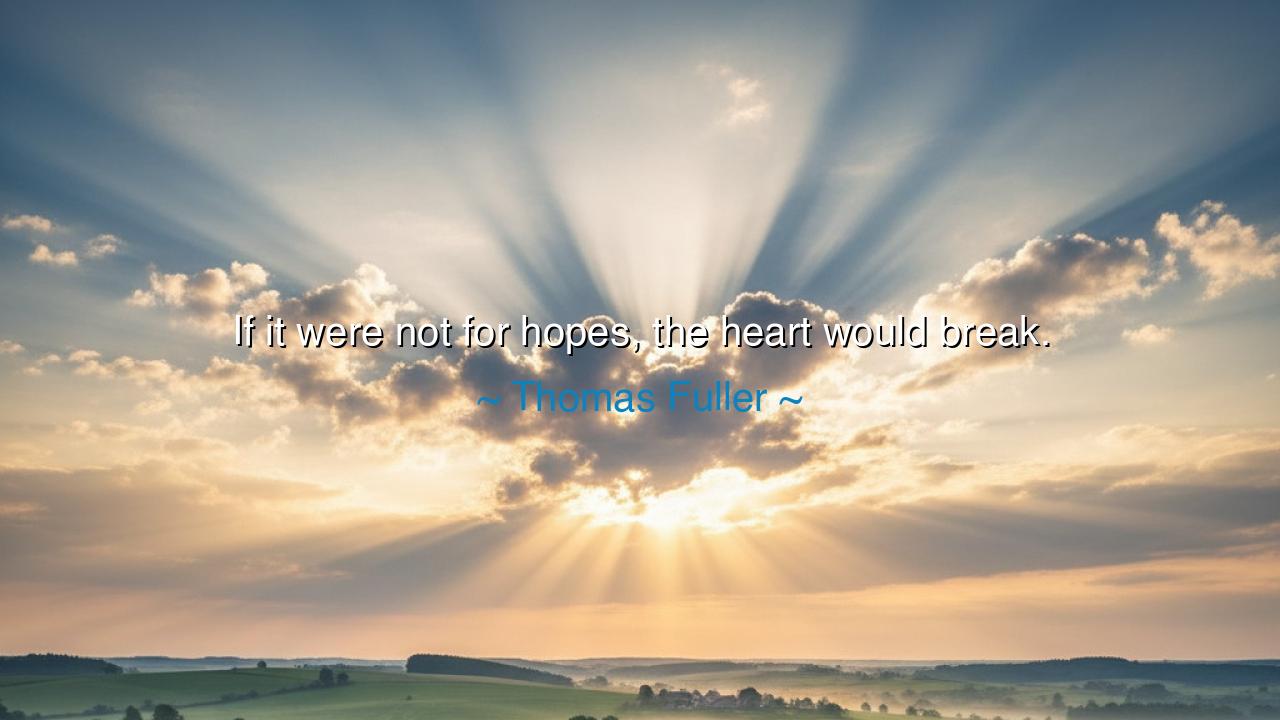
If it were not for hopes, the heart would break.






“If it were not for hopes, the heart would break.” Thus spoke Thomas Fuller, a sage of the seventeenth century, whose words rise from the deep river of human experience. In this single line, he captures the very breath that sustains the soul through its darkest hours. For what is the heart without hope but a vessel emptied of its fire? It may still beat, yet it no longer lives. Hope is the secret flame that refuses extinction; it is the whisper that says, “Endure a little longer, for the dawn will come.”
In the ancient world, poets and prophets alike knew this truth. They spoke of hope not as a luxury, but as the very thread that binds the spirit to existence. When all else is stripped away—wealth, youth, strength—hope remains as the final guardian of the heart. It is the bridge between despair and faith, the invisible force that carries the human soul across the chasms of suffering. Fuller, who lived through times of war, plague, and political turmoil, saw firsthand how men and women survived not through certainty, but through hope’s quiet defiance.
Think of the story of Viktor Frankl, the psychiatrist who endured the horrors of the Nazi concentration camps. In those frozen barracks of death, where the world’s cruelty seemed absolute, Frankl saw a strange truth unfold: those who held to a hope—however small—found a reason to live. Some hoped to see their loved ones again, others to finish a work, to bear witness, or to find meaning even in suffering. The moment a prisoner lost that hope, the light left his eyes, and his strength soon followed. Frankl would later write, “Those who have a ‘why’ to live can bear almost any ‘how.’” His life became a living testament to Fuller’s ancient wisdom: if not for hope, the heart cannot bear its own weight.
There is a subtle power in the way Fuller phrases it—“hopes,” plural, not singular. He knew that life rarely grants one grand, shining hope that endures forever. Instead, it offers many small hopes—tiny sparks that must be tended in the ashes of defeat. The hope of a better day. The hope of reconciliation. The hope that pain will not be meaningless. These are the stars that guide us through the long night. The wise do not scorn small hopes; they gather them and keep them close, for they are the kindling of resilience.
Throughout history, every great rebirth began with this sacred element. The Jews in Babylonian exile, stripped of their homeland, kept alive the hope of return. Centuries later, their descendants would rebuild Jerusalem. The sailors of the Age of Discovery, facing storms and endless horizons, sailed onward not through knowledge, but through the hope that land lay beyond the sea. The civil rights marchers of Selma, beaten and humiliated, walked forward under the hope that justice, though delayed, could not be denied forever. In every age, hope has been humanity’s refuge and rebellion—the refusal to let despair have the final word.
And yet, hope is not mere wishful thinking. It is discipline. It requires faith when there is no evidence, strength when there is no reason, and endurance when there is no reward. The ancients called it a virtue because it must be chosen again and again, especially when all seems lost. To hope is an act of will, a daily vow that the soul makes with itself: “I will not give up.” Hope does not erase pain; it gives it meaning. It does not end the storm; it reminds the heart that beyond the clouds, the sun still burns.
So let this truth be your inheritance: guard your hopes as you would guard your life. When the world grows dark, do not curse the night—light a candle instead. When despair whispers that all is lost, remember Fuller’s words and hold to even the faintest spark. Hope is not weakness; it is the heart’s armor, its defiance against death and doubt.
For if you keep your hope alive, you keep your soul alive. And though the winds may batter you, and the road may vanish beneath your feet, your heart will not break. It will endure—and in that endurance, it will shine.






AAdministratorAdministrator
Welcome, honored guests. Please leave a comment, we will respond soon